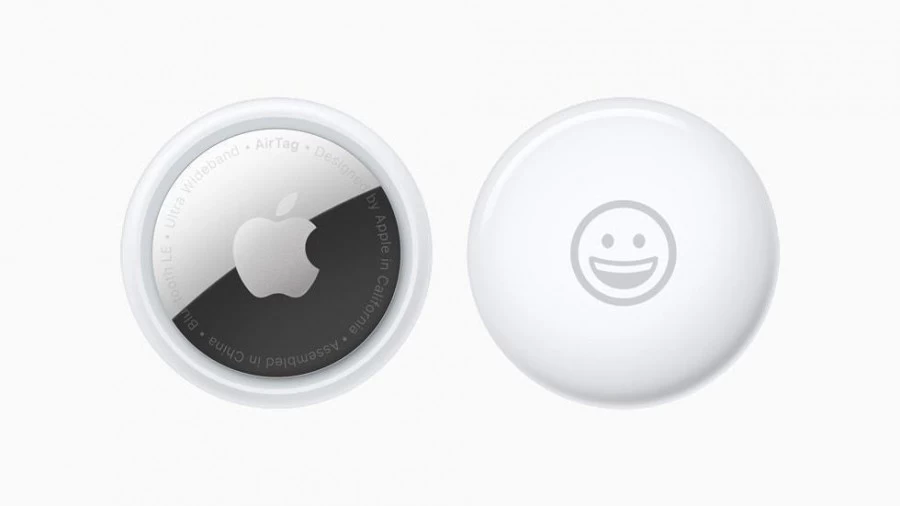Gadget Desk: Apple today officially unveiled AirTag, its location tracking beacons that can help Apple device owners find lost items through Apple’s “Find My” application. The AirTags themselves are small, rounded tracking devices that can be attached to personal items, like purses, bags or keys. Pre-orders start April 23 and are $29 USD for one AirTag or $99 for a pack of four.
The tags are small, polished stainless steel and white, and circular in shape, and have the Apple logo printed on the front. They also come with various case options and keychain dongles, allowing you to add an AirTag to your keys, for example, or a handbag or duffle, and so on. Further customization exists, including emoji symbols.
The item tracking uses the company’s proprietary U1 ultra-wideband chip for what it calls “Precision Finding.” This will work with Apple’s newer iPhones (iPhone 11, 11 Pro and the newer iPhone 12 devices) using the U1 chip and ultra-wideband, as well as other input from the camera, ARKit, accelerator and gyroscope. This way, the Find My app can guide users to a lost AirTag using a combination of sound, haptics and visual feedback.
The device also uses Bluetooth LE (low-energy) and is able to get a year of battery life, according to the company. When the battery is out of juice, it’s user replaceable. Apple says the AirTag is IP67 water- and dust-resistant, which means you could probably drop one in a toilet and it would be okay, but you shouldn’t expect iPhone-like miracles.
A built-in speaker will play sounds to locate the AirTag when the item it’s attached to goes missing. If the AirTag is farther afield than under your couch cushion, for example, users can place the device into a “Lost Mode” that will leverage Apple’s Find My network across everyone’s devices.
To ensure privacy, AirTags’ location data and location history is physically stored inside the device. Communication across the Find My network, meanwhile, is end-to-end encrypted.
And if you come across someone’s lost AirTag, you can tap it with your iPhone or other NFC devices to be taken to a website where you can contact the owner by phone.
At launch, Apple is offering a range of accessories including the Polyurethane Loop in white, navy, yellow and orange ($29), Leather Loop in brown and red ($39), and Leather Key Ring in brown, red and blue ($35). Apple and Hermès teamed up to create the AirTag Hermès, which includes a custom-engraved AirTag, and an assortment of leather accessories including the Bag Charm, Key Ring, Travel Tag and Luggage Tag.
“We’re excited to bring this incredible new capability to iPhone users with the introduction of AirTag, leveraging the vast Find My network, to help them keep track of and find the important items in their lives,” said Kaiann Drance, Apple’s vice president of Worldwide iPhone Product Marketing, in a statement. “With its design, unparalleled finding experience, and built-in privacy and security features, AirTag will provide customers with another way to leverage the power of the Apple ecosystem and enhance the versatility of iPhone.”
In addition to assets found in Apple’s code referencing the new product last year and a mistake in an official Apple YouTube video, AirTags had also been brought up as an example of Apple’s anti-competitive behavior before U.S. regulators.
Last year, Tile spoke about AirTags before a panel of the House of Representatives Judiciary Committee, saying that Apple’s decision to launch its own version of the lost-item finder gave Apple’s new product a first-party advantage over its competitors. Apple’s devices, Tile explained, would be able operate in the background without having to continually pop up requests asking users to agree to background tracking, like Tile’s app has to do. Apple’s devices would also be integrated with “Find My,” but other tags would not be.
Following the regulatory scrutiny, Apple at its developer conference WWDC in June said it would extend “Find My” to third-party companies. However, a report by The Washington Post indicated that olive branch may not have been what it seemed — companies would have to sign an NDA and said Apple customers would be barred from using competing devices simultaneously.
Ahead of today’s event, Apple announced the launch of its Find My Network Accessory program, which officially opened the doors to third-party manufacturers who wanted access to the Find My app. Early adopters included VanMoof’s S3 and X3 e-bikes, Belkin’s SOUNDFORM Freedom True Wireless Earbuds, and an AirTags competitor, the Chipolo ONE Spot — but not Tile. We understand Tile doesn’t want to participate in Find My because it has a direct relationship with customers through its own iOS app that it doesn’t want to give up.
Apple’s entry in this “lost item finder” space means competitors, like Tile, will have more serious competition even with the concessions Apple has made with the opening up of “Find My.” Tile so far has responded to Apple’s plans by pre-announcing its plans to launch its own UWB-powered tracker, arriving this year. Apple’s tight hold over its ecosystem benefits its launch of new products, like AirTags, forcing Tile to focus on touting its advantages, like its wider variety of form factors and cross-platform support.
Apple says customers can pre-order AirTag beginning at 5 a.m. PDT on Friday, April 23. The Apple Store app, Apple Stores locations, Apple Authorized Resellers and select carriers will stock AirTags and other accessories as of Friday, April 30.


